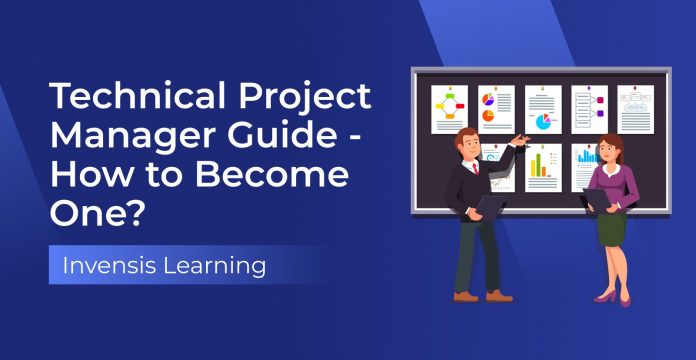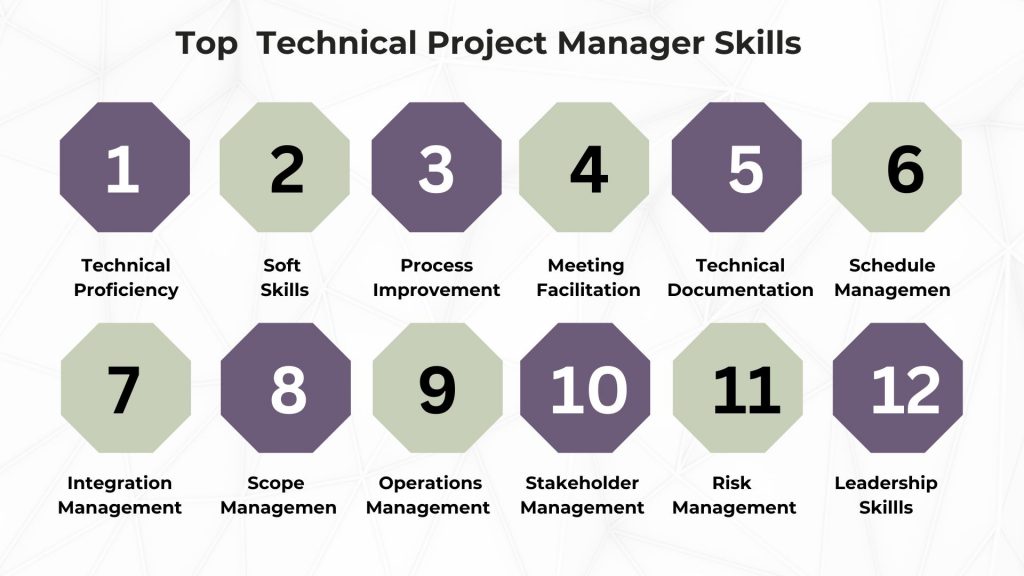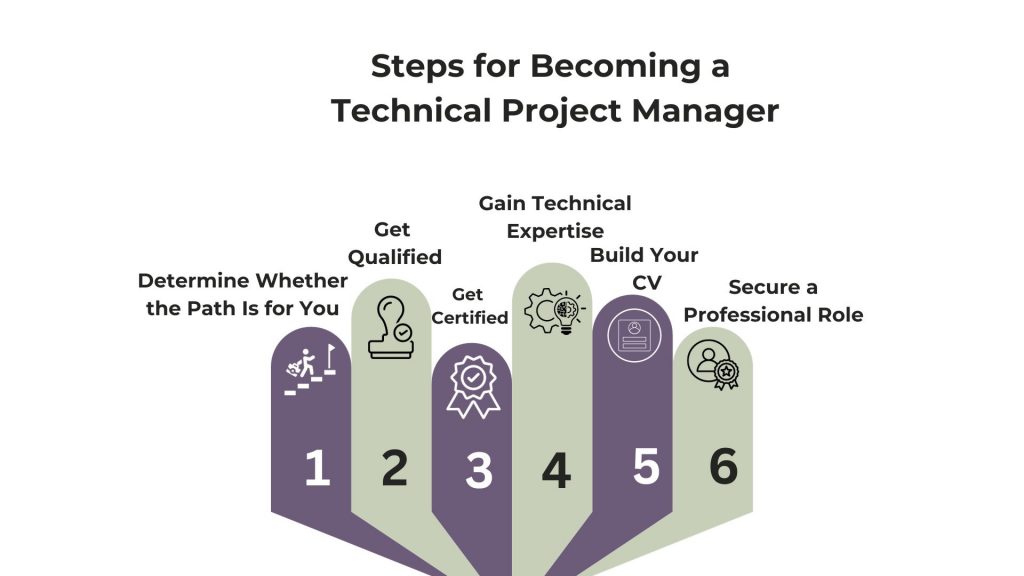
Technical Project Managers are pivotal in collaborating with individuals with diverse technical backgrounds, ranging from entry-level professionals to high-ranking executives. They bridge gaps between marketers and software developers, ensuring smooth project progress.
In this blog, we’ll explore the responsibilities and essential soft skills of TPMs, highlighting how they harmonize technical complexities with effective communication.
Table of Contents
- What Is a Technical Project Manager?
- Technical Project Manager vs Project Manager
- What Does a Technical Project Manager Do?
- Skills Required to Become a Technical Project Manager
- How Do You Become a Technical Project Manager?
- What Tools Do Technical Project Managers Need to Know?
- Technical Project Manager Salary
- Conclusion
What is a Technical Project Manager?
A Technical Project Manager is a versatile professional with a unique blend of technical expertise and project management skills. This role is pivotal in information technology (IT), as it involves overseeing and leading IT projects while effectively managing technical teams within an organization.
It can be best described as a hybrid role that requires a deep understanding of technology and management principles.
A Technical Project Manager serves as the linchpin for complex IT or engineering projects, leveraging their subject matter expertise to guide projects to completion and provide invaluable support to project team members.
They excel in bridging the gap between technical intricacies and effective project management, optimizing resource allocation, project planning, and successful project delivery through a balanced blend of technical understanding and communication skills.
Technical Project Manager vs Project Manager
Technical project managers and project managers both play crucial roles in project management, but they differ in their primary focus and expertise.
Now, let us look into the table to understand the differences better:
| Context | Technical Project Manager | Project Manager |
| Primary Focus | Manages and leads technical projects and teams in IT or engineering domains | Manages a wide range of projects across various industries and domains |
| Expertise Requirement | Requires significant technical expertise in specific domains (e.g., IT, engineering) | Emphasizes general project management skills and may not require domain-specific expertise |
| Role Specialization | Specializes in handling complex technical aspects, such as software development, infrastructure, or engineering | Adapts to diverse projects, including marketing, construction, healthcare, and more |
| Technical Problem Solving | Solves technical challenges and makes critical decisions regarding technology choices | Focuses on solving project-related issues and managing project timelines, resources, and budgets |
| Project Scope | Typically handles IT or engineering projects, often with specific technical goals and requirements | Manages projects across a wide spectrum, ranging from marketing campaigns to construction projects |
| Risk Assessment | Assesses technical risks and develops strategies to mitigate them in the context of technology and systems | Evaluate project risks and develop risk mitigation plans for the overall project |
| Project Outcomes | Aims to deliver technically sound products, systems, or solutions meeting technical specifications | Focuses on delivering successful projects within budget, scope, and schedule constraints |
What Does a Technical Project Manager Do?
A technical project manager’s role is multifaceted and dynamic, encompassing a range of responsibilities essential for successfully executing highly technical projects. In this pivotal role, you serve as the orchestrator of complex technical endeavors, overseeing multiple aspects to ensure project objectives are met within stipulated timelines.
Your core responsibilities include:
- Project Coordination: Managing projects across various teams with a stake in the technical aspects, ensuring effective collaboration, and keeping the project on track
- Master Planning: Developing a comprehensive project plan that outlines tasks, timelines, and resource allocation to drive progress and meet project deadlines
- Stakeholder Liaison: Engaging with non-technical stakeholders to align project goals with business objectives, fostering effective communication, and addressing concerns
- Visionary Leadership: Creating a clear vision for the project, along with troubleshooting and managing all facets of its execution
- Subject Matter Expertise: Serving as the lead subject-matter expert in your organization concerning technology, guiding and advising on technical decisions
- Resource Management: Recruiting and training technical staff, improving project planning and resource allocation, and managing project budgets
- Technology Research: Researching and evaluating new technologies for projects and ensuring their maintenance and integration into existing systems
- Project Analysis: Analyzing, planning, and developing project schedules, defining clear deliverables, roles, and responsibilities for team members
- Technology Maintenance: Updating and maintaining production technologies, overseeing proper maintenance and installation procedures
- Team Building: Recruiting and training future employees to fulfill technical department positions, contributing to team growth and development
A Technical Project Manager is a pivotal figure at the intersection of technology, business, and client needs, spearheading the successful execution of highly technical projects through effective leadership, coordination, and technical expertise.
Also read the blog to understand the roles and responsibilities of an IT Project Manager!
Skills Required to Become a Technical Project Manager
Becoming a successful Technical Project Manager is a demanding endeavor that necessitates a diverse skill set encompassing both technical and interpersonal proficiencies.
Here are the essential skills you need to excel in this multifaceted role:
1. Technical Proficiency
With technical projects, you must possess deep knowledge and expertise in the specific technical domain relevant to your projects. This includes understanding software development, Scrum, Agile methodology, and tools like JIRA
2. Soft Skills
Effective communication, leadership, problem-solving, and conflict resolution are vital soft skills for navigating the complexities of technical project management
3. Process Improvement
The ability to identify and implement process improvements is crucial for enhancing project efficiency and product outcomes
4. Meeting Facilitation
Skill in orchestrating productive meetings, fostering collaboration, and keeping stakeholders aligned on project goals
5. Technical Documentation
Proficiency in creating and maintaining technical documentation is essential for clarity and knowledge transfer within the team
6. Schedule Management
Mastering schedule management tools like Gantt charts and expertise in release and sprint planning are vital for project timeline adherence
7. Integration Management
Skills in creating project charters, tracking lessons learned, and strategic planning are necessary for seamless integration of project components
8. Scope Management
The ability to develop work breakdown structures and document requirements is vital for defining project scope accurately
9. Operations Management
Efficiently managing day-to-day tasks and company resources to ensure project success while staying fiscally responsible is a critical aspect of the role
10. Stakeholder Management
The capability to plan stakeholder communication and engage effectively with stakeholders is essential for project alignment and support
11. Risk Management
Proactive identification, analysis, and mitigation of project risks are vital to prevent budget overruns, delays, or project standstills
12. Leadership
Leadership skills involve motivating teams, fostering collaboration, and generating a sense of urgency when necessary to ensure project success
Becoming a proficient technical project manager requires a constant commitment to developing and honing these skills, as they are instrumental in managing the intricate balance between technology, business goals, and project success in today’s dynamic and demanding job market.
How Do You Become a Technical Project Manager?
Becoming a technical project manager involves a series of strategic steps to acquire the necessary qualifications, certifications, and experience in the field. By following these structured steps, you can pave the way for a successful career as a technical project manager.
Determine Whether the Path Is for You
Before embarking on your journey to become a technical project manager, it’s essential to assess whether this career aligns with your aspirations. Read about the experiences of other technical project managers, engage in informational interviews with industry professionals for insights, or volunteer for projects that expose you to technical challenges.
Get Qualified
To lay the foundation, ensure you have the necessary qualifications. A minimum requirement is an undergraduate degree, preferably in a technology-related field such as computer science, software engineering, IT, cybersecurity, or management information systems. Some positions may demand a master’s degree.
Get Certified
Once you’ve acquired the essential hard skills and practical experience, it’s time to pursue project management certifications that set you apart. These certifications not only demonstrate your project management understanding but also signify specialized technical expertise.
Get Certified
Once you’ve acquired the essential hard skills and practical experience, it’s time to pursue project management certifications that set you apart. These certifications not only demonstrate your project management understanding but also signify specialized technical expertise.
Consider certifications like:
- Agile Certified Practitioner (ACP)
- Certified Scrum Master (CSM)
- Certified Associate in Project Management (CAPM)
- Professional in Business Analysis (PBA)
- Certified Business Analysis Professional (CBAP)
Additionally, consider pursuing a project management certification, such as PMP Certification, to showcase your comprehensive understanding of project management principles and commitment to structured processes.
Gain Technical and Project Management Experience
Apply your qualifications and skills by working on actual projects to gain relevant experience in technical project management. Seek volunteer or contract opportunities within your network or design and manage your projects. Practical experience is invaluable in this field.
Build Your Technical Project Manager CV
As you accumulate experience, qualifications, and technical project management skills, craft a compelling CV that showcases your capabilities. Research technical project manager roles on job platforms, align your qualifications with job descriptions and present them effectively on your CV.
Secure a Professional Role
The final step in your journey is to secure a job opportunity as a technical project manager. Leverage your professional network for job referrals, participate in industry events, and continue working on independent projects to keep your skills current. Target roles that align your previous experience with your new technical skills to bring you closer to your career goals.
What Tools Does a Technical Project Manager Need to Know?
Technical project managers must be proficient in various tools to oversee complex technical projects effectively. Mastery of these tools is essential for seamless project coordination and successful execution in the dynamic world of technical project management.
- Project Management Tools
- Microsoft Project
- JIRA
- monday.com
- Trello
- Asana
- Communication and Collaboration Tools
- Slack
- Microsoft Teams
- Zoom
- Skype for Business
- Documentation and Version Control
- Confluence
- SharePoint
- Git/GitHub
- Subversion (SVN)
- Agile and Scrum Tools
- AgileCraft
- VersionOne
- Rally (formerly CA Agile Central)
- Cloud Services
- Amazon Web Services (AWS)
- Microsoft Azure
- Google Cloud Platform (GCP)
- Data Analytics and Visualization
- Tableau
- Power BI
- Google Data Studio
- Development Tools (depending on the tech stack)
- Visual Studio Code
- Eclipse
- IntelliJ IDEA
- Quality Assurance and Testing Tools
- Selenium
- JUnit
- TestRail
- Documentation and Reporting
- Microsoft Word, Excel, PowerPoint
- Google Workspace (Docs, Sheets, Slides)
- Version Control and DevOps
- Jenkins
- Docker
- Kubernetes
- Database Management
- SQL Server Management Studio
- Oracle SQL Developer
- MySQL Workbench
- Security Tools (for cybersecurity projects)
- Nessus
- Wireshark
- Metasploit
- Collaborative Coding and Code Review Tools
- GitHub
- GitLab
- Bitbucket
- Resource Management and Planning
- Smartsheet
- Microsoft Project Server
- Customer Relationship Management (CRM)
- Salesforce
- HubSpot
- Budget and Financial Management
- QuickBooks
- Microsoft Excel (for financial modeling)
Technical Project Manager Salary
Aspiring technical project managers starting in entry-level positions can anticipate earning up to $65,000. With 1-4 years of experience, you can secure an average compensation of $78,000, while mid-career professionals boasting 5-9 years of experience typically earn an average salary of $92,000.
Seasoned technical project managers with 10-19 years of experience have the potential to command salaries of up to $105,000, while those with over 20 years of experience can expect earnings of $122,000 or more.
Conclusion
Starting a career as a technical project manager is a challenging yet rewarding journey. The role demands a unique blend of technical expertise and project management skills to navigate the complexities of today’s technology-driven projects successfully. With opportunities for growth and competitive compensation, it’s a career path worth exploring for those passionate about technology and project leadership.
To kickstart your journey towards becoming a proficient technical project manager, consider enrolling in project management certification courses from Invensis Learning. These courses provide valuable insights, skills, and certifications that can empower you with the knowledge and tools needed to excel in this dynamic field.
















